| Louisville Bats | |||||
|---|---|---|---|---|---|
| |||||
| |||||
| Minor league affiliations | |||||
| Class | Triple-A (1982–present) | ||||
| League | International League (2022–present) | ||||
| Division | West Division | ||||
Previous leagues |
| ||||
| Major league affiliations | |||||
| Team | Cincinnati Reds (2000–present) | ||||
| Previous teams |
| ||||
| Minor league titles | |||||
| League titles (4) |
| ||||
| Division titles (8) |
| ||||
| Team data | |||||
| Name | Louisville Bats (2002–present) | ||||
Previous names |
| ||||
| Colors | Red, navy, white[1] | ||||
| Mascot | Buddy Bat | ||||
| Ballpark | Louisville Slugger Field (2000–present) | ||||
Previous parks |
| ||||
Owner(s)/ Operator(s) | Diamond Baseball Holdings[2] | ||||
| President | Greg Galiette[3] | ||||
| Manager | Pat Kelly | ||||
The Louisville Bats are a Minor League Baseball team of the International League (IL) and the Triple-A affiliate of the Cincinnati Reds. They are located in Louisville, Kentucky, and are named in dual reference to the winged mammal and baseball bats, such as those manufactured locally under the Louisville Slugger brand. The team plays their home games at Louisville Slugger Field, which opened in 2000. The Bats previously played at Cardinal Stadium from 1982 to 1999.
The club began play as the Louisville Redbirds in the Triple-A American Association (AA) in 1982. Louisville won three AA championships: in 1984, 1985, and 1995 as the top affiliate of the St. Louis Cardinals. They joined the Triple-A International League in 1998 following the dissolution of the AA after the 1997 season. The Redbirds rebranded as the Louisville RiverBats in 1999; this was shortened to Bats in 2002. In conjunction with Major League Baseball's restructuring of Minor League Baseball in 2021, the Bats were shifted to the Triple-A East, but this was renamed the International League in 2022. Their lone IL championship was won in 2001 with Cincinnati.
History
American Association (1982–1997)
In 1982, the St. Louis Cardinals moved their Triple-A team of the American Association (AA), the Springfield Redbirds, from Springfield, Illinois, to Louisville, Kentucky, where they became the Louisville Redbirds. They played their home games at Cardinal Stadium, which was located at the Kentucky Exposition Center and seated over 30,000 people.[4] The stadium previously hosted the Louisville Colonels from 1957 to 1972.[4]
During their inaugural 1982 season, the Redbirds broke the minor league attendance record by drawing 868,418 people to Cardinal Stadium.[5] On the field, the team narrowly missed the playoffs when they finished in second place, just one-and-a-half games out of first at 73–62.[6] In 1983, the Redbirds became the first minor league team to draw over one million fans in a single season (1,052,438).[4] The team improved to league-best 78–57 and won the Eastern Division title, which qualified them for the postseason. Though Louisville won the semifinals versus the Oklahoma City 89ers, 3–2, they lost the AA championship to the Denver Bears, 4–0, in the finals.[7] Manager Jim Fregosi was selected as the AA Manager of the Year.[8] The franchise was awarded the 1983 John H. Johnson President's Award, recognizing them as the "complete baseball franchise—based on franchise stability, contributions to league stability, contributions to baseball in the community, and promotion of the baseball industry."[9]
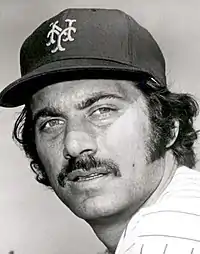
Fergosi led the Redbirds to win back-to-back American Association championships in 1984 and 1985. The 1984 squad won the semifinals against the Indianapolis Indians, 4–2, before winning their first league title over the Denver Zephyrs, 4–1.[10] Their second came the next season after winning the 1985 Eastern Division title and defeating Oklahoma City, 4–1, in the only round of playoffs.[11] Fergosi won his second Manager of the Year Award for the 1985 campaign.[8]
The 1987 team made a return to the postseason, but they were eliminated by Indianapolis, 3–2, in the semifinals.[12] Outfielder Lance Johnson was honored with both the AA Most Valuable Player (MVP) Award and Rookie of the Year Award.[8] Louisville regularly finished third or fourth in their four-team division over the next six seasons. A pair of Redbirds won league awards, however, during this period. René Arocha was selected as the 1992 Most Valuable Pitcher, and catcher Todd Zeile was the 1989 Rookie of the Year.[8] The team qualified for a playoff spot in 1994, but they were quickly swept out of the semifinals, 3–0, by Indianapolis.[13] The Redbirds came back in 1995 to sweep Indianapolis in the semis before winning a third AA championship versus the Buffalo Bisons, 3–2, behind manager Joe Pettini.[14]
International League (1998–2020)
Louisville experienced a number of changes around the turn of the millennium. The American Association, of which the Redbirds had been members since 1982, disbanded after the 1997 season. Its teams were absorbed by the two remaining Triple-A leagues—the International League (IL) and Pacific Coast League (PCL), with Louisville joining the IL. Their 16-year relationship with the St. Louis Cardinals also ended after the 1997 season when the Cardinals chose to move their Triple-A affiliation to the Memphis Redbirds, a PCL expansion team. Louisville then became the top farm club of the Milwaukee Brewers in 1998. They started their time in the IL by winning the Western Division title, but in the Governors' Cup playoffs, they were eliminated in the semifinals by the Durham Bulls, 3–0.[15] In 1999, the team rebranded as the Louisville RiverBats.[16] The name was a dual reference to Louisville's location on the Ohio River and baseball bats, such as those manufactured locally under the Louisville Slugger brand. Their new logos incorporated a bat (the animal) swinging a baseball bat.[17] After a second season with the Brewers, Louisville entered into a new affiliation with the Cincinnati Reds in 2000. They also left Cardinal Stadium for the new US$27.8 million Louisville Slugger Field.[18] Located in downtown Louisville, the new ballpark seats 13,131 people with a more intimate setting than their previous facility.[19]
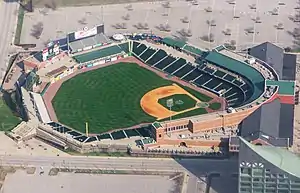
In 2001, manager Dave Miley led the RiverBats to an 84–60 record and the Western Division title. They defeated the Norfolk Tides, 3–2, in the semifinals to advance to the final round against the Scranton/Wilkes-Barre Red Barons. Louisville won the first game of the series, 2–1, before the September 11 terrorist attacks resulted in the cancellation of the rest of the playoffs. The RiverBats were declared the International League champions for 2001.[20]
Louisville dropped "River" from its name to become simply the Louisville Bats in 2002.[16] Outfielder Raúl González won that season's IL MVP Award.[21] The team returned to the playoffs in 2003, with another division title, but they were ousted in the semifinals by Durham, 3–1.[22] In 2007, first baseman Joey Votto was selected for the IL Rookie of the Year Award.[21] The Bats made three consecutive trips to the postseason from 2008 to 2010 with back-to-back-to-back division titles, but they were eliminated by Durham each time in the semifinals.[23][24][25] Rick Sweet won the IL Manager of the Year Award in 2008 and 2009, and Justin Lehr won the Most Valuable Pitcher Award in 2009.[21] Typically finishing third or fourth out of four teams in the Western Division, Louisville did not again qualify for the Governors' Cup playoffs after 2010.
Right fielder Aristides Aquino was selected as the 2019 IL Rookie of the Year.[21] The start of the 2020 season was postponed due to the COVID-19 pandemic before being cancelled on June 30.[26][27]
Triple-A East / International League (2021–present)
Following the 2020 season, Major League Baseball assumed control of Minor League Baseball in a move to increase player salaries, modernize facility standards, and reduce travel. The Cincinnati Reds retained Louisville as their Triple-A affiliate, but the International League disbanded, and the Bats followed the other IL teams into the Triple-A East.[28] Louisville ended the season in sixth place in the Midwestern Division with a 51–68 record.[29] No playoffs were held to determine a league champion; instead, the team with the best regular-season record was declared the winner.[30] However, 10 games that had been postponed from the start of the season were reinserted into the schedule as a postseason tournament called the Triple-A Final Stretch in which all 30 Triple-A clubs competed for the highest winning percentage.[30] Louisville finished the tournament tied for 18th place with a 4–5 record.[31] In 2022, the Triple-A East became known as the International League, the name historically used by the regional circuit prior to the 2021 reorganization.[32] In December 2023, the team was purchased by Diamond Baseball Holdings.[2]
Season-by-season records
| League | The team's final position in the league standings |
|---|---|
| Division | The team's final position in the divisional standings |
| GB | Games behind the team that finished in first place in the division that season |
| ‡ | Class champions (1983–present) |
| † | League champions (1982–present) |
| * | Division champions (1982–present) |
| ^ | Postseason berth (1982–present) |
| Season | League | Regular-season | Postseason | MLB affiliate | Ref. | ||||||
|---|---|---|---|---|---|---|---|---|---|---|---|
| Record | Win % | League | Division | GB | Record | Win % | Result | ||||
| 1982 | AA | 73–62 | .541 | 2nd (tie) | 2nd (tie) | 1+1⁄2 | — | — | — | St. Louis Cardinals | [6] |
| 1983 * |
AA | 78–57 | .578 | 1st | 1st | — | 3–6 | .333 | Won Eastern Division title Won semifinals vs. Oklahoma City 89ers, 3–2 Lost AA championship vs. Denver Bears, 4–0[7] |
St. Louis Cardinals | [33] |
| 1984 ^ † |
AA | 79–76 | .510 | 4th | — | 12+1⁄2 | 8–3 | .727 | Won semifinals vs. Indianapolis Indians, 4–2 Won AA championship vs. Denver Zephyrs, 4–1[10] |
St. Louis Cardinals | [34] |
| 1985 * † |
AA | 74–68 | .521 | 3rd | 1st | — | 4–1 | .800 | Won Eastern Division title Won AA championship vs. Oklahoma City 89ers, 4–1[11] |
St. Louis Cardinals | [35] |
| 1986 | AA | 64–78 | .451 | 7th | 4th | 16 | — | — | — | St. Louis Cardinals | [36] |
| 1987 ^ |
AA | 78–62 | .557 | 2nd | — | 1 | 2–3 | .400 | Lost semifinals vs. Indianapolis Indians, 3–2[12] | St. Louis Cardinals | [37] |
| 1988 | AA | 63–79 | .444 | 8th | 4th | 26 | — | — | — | St. Louis Cardinals | [38] |
| 1989 | AA | 71–74 | .490 | 5th | 4th | 15+1⁄2 | — | — | — | St. Louis Cardinals | [39] |
| 1990 | AA | 74–72 | .507 | 4th | 3rd | 11+1⁄2 | — | — | — | St. Louis Cardinals | [40] |
| 1991 | AA | 51–92 | .357 | 8th | 4th | 30 | — | — | — | St. Louis Cardinals | [41] |
| 1992 | AA | 73–70 | .510 | 4th | 3rd | 13+1⁄2 | — | — | — | St. Louis Cardinals | [42] |
| 1993 | AA | 68–76 | .472 | 6th | 3rd | 13+1⁄2 | — | — | — | St. Louis Cardinals | [43] |
| 1994 ^ |
AA | 74–68 | .521 | 4th | — | 11+1⁄2 | 0–3 | .000 | Lost semifinals vs. Indianapolis Indians, 3–0[13] | St. Louis Cardinals | [44] |
| 1995 ^ † |
AA | 74–70 | .514 | 4th | — | 14 | 6–2 | .750 | Won semifinals vs. Indianapolis Indians, 3–0 Won AA championship vs. Buffalo Bisons, 3–2[14] |
St. Louis Cardinals | [45] |
| 1996 | AA | 60–84 | .417 | 7th | 4th | 24 | — | — | — | St. Louis Cardinals | [46] |
| 1997 | AA | 58–85 | .406 | 8th | 4th | 28+1⁄2 | — | — | — | St. Louis Cardinals | [47] |
| 1998 * |
IL | 77–67 | .535 | 5th | 1st | — | 0–3 | .000 | Won Western Division title Lost semifinals vs. Durham Bulls, 3–0[15] |
Milwaukee Brewers | [48] |
| 1999 | IL | 63–81 | .438 | 11th | 3rd | 21+1⁄2 | — | — | — | Milwaukee Brewers | [49] |
| 2000 | IL | 71–73 | .493 | 9th | 3rd | 10 | — | — | — | Cincinnati Reds | [50] |
| 2001 * † |
IL | 84–60 | .583 | 3rd | 1st | — | 4–2 | .667 | Won Western Division title Won semifinals vs. Norfolk Tides, 3–2 Won IL championship vs. Scranton/Wilkes-Barre Red Barons, 1–0[lower-alpha 1][20] |
Cincinnati Reds | [51] |
| 2002 | IL | 79–65 | .549 | 6th | 2nd | 2 | — | — | — | Cincinnati Reds | [52] |
| 2003 * |
IL | 79–64 | .552 | 2nd | 1st | — | 1–3 | .250 | Won Western Division title Lost semifinals vs. Durham Bulls, 3–1[22] |
Cincinnati Reds | [53] |
| 2004 | IL | 67–77 | .465 | 10th | 2nd | 13 | — | — | — | Cincinnati Reds | [54] |
| 2005 | IL | 66–78 | .458 | 11th | 4th | 23 | — | — | — | Cincinnati Reds | [55] |
| 2006 | IL | 75–68 | .524 | 6th | 3rd | 1+1⁄2 | — | — | — | Cincinnati Reds | [56] |
| 2007 | IL | 74–70 | .514 | 7th | 2nd | 8+1⁄2 | — | — | — | Cincinnati Reds | [57] |
| 2008 * |
IL | 88–56 | .611 | 1st (tie) | 1st | — | 1–3 | .250 | Won Western Division title Lost semifinals vs. Durham Bulls, 3–1[23] |
Cincinnati Reds | [58] |
| 2009 * |
IL | 84–58 | .592 | 1st | 1st | — | 2–3 | .400 | Won Western Division title Lost semifinals vs. Durham Bulls, 3–2[24] |
Cincinnati Reds | [59] |
| 2010 * |
IL | 79–64 | .552 | 3rd | 1st | — | 2–3 | .400 | Won Western Division title Lost semifinals vs. Durham Bulls, 3–2[25] |
Cincinnati Reds | [60] |
| 2011 | IL | 73–71 | .507 | 8th | 3rd | 15 | — | — | — | Cincinnati Reds | [61] |
| 2012 | IL | 51–93 | .354 | 14th | 4th | 38 | — | — | — | Cincinnati Reds | [62] |
| 2013 | IL | 69–75 | .479 | 9th | 3rd | 11 | — | — | — | Cincinnati Reds | [63] |
| 2014 | IL | 68–75 | .476 | 9th | 4th | 10+1⁄2 | — | — | — | Cincinnati Reds | [64] |
| 2015 | IL | 64–80 | .444 | 11th | 3rd | 19 | — | — | — | Cincinnati Reds | [65] |
| 2016 | IL | 71–73 | .493 | 6th | 2nd | 11 | — | — | — | Cincinnati Reds | [66] |
| 2017 | IL | 56–86 | .394 | 13th | 4th | 23 | — | — | — | Cincinnati Reds | [67] |
| 2018 | IL | 61–76 | .445 | 13th | 4th | 11 | — | — | — | Cincinnati Reds | [68] |
| 2019 | IL | 59–81 | .421 | 13th (tie) | 4th | 22 | — | — | — | Cincinnati Reds | [69] |
| 2020 | IL | Season cancelled (COVID-19 pandemic)[27] | Cincinnati Reds | [70] | |||||||
| 2021 | AAAE | 51–68 | .429 | 15th | 6th | 17+1⁄2 | 4–5 | .444 | Won series vs. Toledo Mud Hens, 3–2 Lost series vs. Columbus Clippers, 3–1 Placed 18th (tie) in the Triple-A Final Stretch[31] |
Cincinnati Reds | [29] |
| 2022 | IL | 60–90 | .400 | 19th | 10th | 31+1⁄2 | — | — | — | Cincinnati Reds | [71] |
| 2023 | IL | 75–73 | .507 | 9th | 4th | 9 | — | — | — | Cincinnati Reds | [72] |
| Totals | — | 2,856–2,995 | .488 | — | — | — | 37–40 | .481 | — | — | — |
Logos and colors
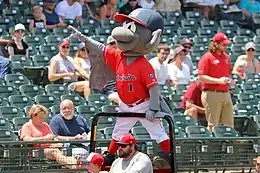
The Louisville Redbirds based their original visual identity on that of their major league parent, the St. Louis Cardinals, from 1982 to 1998. The team's uniforms were of red and white, while their logo featured a cardinal preparing to swing a baseball bat.[73] When they rebranded as the RiverBats in 1999, their color scheme became purple and green, while the logo depicted a bat swinging a baseball bat.[74] When this moniker was shortened to "Bats" in 2002, the palate was switched to purple, black, and gold, and the logo to an abstract bat shape.[75] The Bats' current color scheme of red, navy blue, and white was adopted in 2016. Additionally, the rebranding updated the logo to depict a flying bat in front of a moon, which resembled a baseball, while gripping a baseball bat in its talons.[76]
Radio and television
Since 2019, Jim Kelch has been the play-by-play announcer for Bats radio broadcasts. He previously served in the role from 1989 to 2009 before leaving to work for the Cincinnati Reds broadcast team from 2010 to 2017.[77] Other Louisville broadcasters that went on to broadcast for MLB teams include Joe Buck (1989–1990), Todd Kalas (1991), and Mark Neely (1992–1994).
As of 2019, all Bats home and road games were broadcast on WKRD 790 AM. Live audio broadcasts are also available online through the team's website and the MiLB First Pitch app.[77] Games can be viewed through the MiLB.TV subscription feature of the official website of Minor League Baseball, with audio provided by a radio simulcast.[78]
Roster
| Players | Coaches/Other | |||
|
Pitchers
|
Catchers
Infielders
Outfielders
|
Manager
Coaches
60-day injured list
| ||
Achievements
Awards
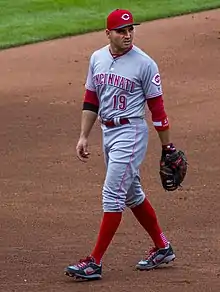
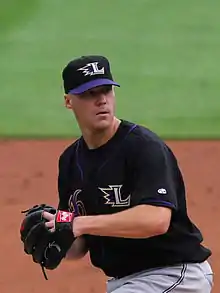
The franchise has been awarded these honors by Minor League Baseball.
| Award | Season | Ref. |
|---|---|---|
| John H. Johnson President's Award | 1983 | [9] |
Seven players, two managers, and two executives have won league awards in recognition for their performance with Louisville.[8][21]
| Award | Recipient | Season | Ref. |
|---|---|---|---|
| Most Valuable Player | Lance Johnson | 1987 | [8] |
| Most Valuable Pitcher | René Arocha | 1992 | [8] |
| Rookie of the Year | Lance Johnson | 1987 | [8] |
| Rookie of the Year | Todd Zeile | 1989 | [8] |
| Manager of the Year | Jim Fregosi | 1983 | [8] |
| Manager of the Year | Jim Fregosi | 1985 | [8] |
| Award | Recipient | Season | Ref. |
|---|---|---|---|
| Most Valuable Player | Raúl González | 2002 | [21] |
| Most Valuable Pitcher | Justin Lehr | 2009 | [21] |
| Rookie of the Year | Joey Votto | 2007 | [21] |
| Rookie of the Year | Aristides Aquino | 2019 | [21] |
| Manager of the Year | Rick Sweet | 2008 | [21] |
| Manager of the Year | Rick Sweet | 2009 | [21] |
| Executive of the Year | Gary Ulmer | 2007 | [21] |
| Spirit of the IL | Lois Estridge | 2014 | [21] |
Retired numbers
Louisville has honored one of its players by retiring their uniform number. Corky Miller's number 8 was retired on August 31, 2014. A catcher from 2001 to 2004 and 2009 to 2014, Miller held the franchise record for games played (548) and doubles (99) at the time of its retirement.[79]
The Bats also retired the number 1 for Louisville native and Baseball Hall of Famer Harold "Pee Wee" Reese in a ceremony on July 28, 2018.[80] Reese's Brooklyn Dodgers teammate Jackie Robinson, whose number 42 was retired throughout professional baseball on April 15, 1997,[81] was honored at the same ceremony.[80]
Managers
Louisville has had 17 managers since their inaugural 1982 season.
| Manager | Season(s) |
|---|---|
| Joe Frazier | 1982 |
| Jim Fregosi | 1983–1986 |
| Dave Bialas | 1986 |
| Mike Jorgensen | 1987–1989 |
| Gaylen Pitts | 1990 |
| Mark DeJohn | 1991 |
| Jack Krol | 1992–1993 |
| Joe Pettini | 1994–1996 |
| Gaylen Pitts | 1997 |
| Gary Allenson | 1998–1999 |
| Dave Miley | 2000–2003 |
| Rick Burleson | 2003–2004 |
| Rick Sweet | 2005–2011 |
| David Bell | 2012–2013 |
| Jim Riggleman | 2014 |
| Delino DeShields | 2015–2017 |
| Pat Kelly | 2018 |
| Jody Davis | 2019 |
| Pat Kelly | 2020–present |
Notes
- ↑ The 2001 playoffs were cancelled in the wake the September 11 terrorist attacks. Louisville, which had won the first game of the series, 2–1, before its cancellation, was declared the winner.
See also
References
- Specific
- ↑ Fischer, Chadwick (November 13, 2015). "Louisville Bats Unveil New Logos and Uniforms". Louisville Bats. Minor League Baseball. Retrieved April 19, 2021.
- 1 2 "Louisville Bats Begin New Chapter with Diamond Baseball Holdings". Louisville Bats. Minor League Baseball. December 5, 2023. Retrieved December 6, 2023.
- ↑ "Front Office Staff". Louisville Bats. Minor League Baseball. Retrieved December 9, 2021.
- 1 2 3 "Cardinal Stadium". Stats Crew. Retrieved April 19, 2021.
- ↑ Reed, William F. (July 11, 1983). "Louisville Is A Major Minor". Sports Illustrated. Archived from the original on December 13, 2013. Retrieved February 26, 2017.
- 1 2 "1982 American Association". Baseball-Reference. Sports Reference. Retrieved April 17, 2021.
- 1 2 "1983 American Association". Stats Crew. Retrieved April 17, 2021.
- 1 2 3 4 5 6 7 8 9 10 11 "American Association Special Award Winners". Triple-A Baseball. Retrieved April 19, 2021.
- 1 2 "Minor League Baseball Award Winners". Minor League Baseball. Retrieved April 17, 2021.
- 1 2 "1984 American Association". Stats Crew. Retrieved April 17, 2021.
- 1 2 "1985 American Association". Stats Crew. Retrieved April 17, 2021.
- 1 2 "1985 American Association". Stats Crew. Retrieved April 17, 2021.
- 1 2 "1994 American Association". Stats Crew. Retrieved April 17, 2021.
- 1 2 "1995 American Association". Stats Crew. Retrieved April 17, 2021.
- 1 2 "1998 International League". Stats Crew. Retrieved April 17, 2021.
- 1 2 "Louisville, Kentucky Encyclopedia". Baseball-Reference.com. Retrieved February 26, 2017.
- ↑ "Louisville RiverBats Logo". Sports Logos. November 24, 2015. Retrieved April 20, 2021.
- ↑ "Louisville Slugger Field". Stats Crew. Retrieved April 20, 2021.
- ↑ "History of Louisville Slugger Field". Louisville Bats. Minor League Baseball. Retrieved April 20, 2021.
- 1 2 "2001 International League". Stats Crew. Retrieved April 17, 2021.
- 1 2 3 4 5 6 7 8 9 10 11 12 13 "International League Award Winners". International League. Minor League Baseball. Retrieved April 19, 2021.
- 1 2 "2003 International League". Stats Crew. Retrieved April 17, 2021.
- 1 2 "2008 International League". Stats Crew. Retrieved April 17, 2021.
- 1 2 "2009 International League". Stats Crew. Retrieved April 17, 2021.
- 1 2 "2010 International League". Stats Crew. Retrieved April 17, 2021.
- ↑ "A Message From Pat O'Conner". Minor League Baseball. March 13, 2020. Retrieved May 5, 2020.
- 1 2 "2020 Minor League Baseball Season Shelved". Minor League Baseball. June 30, 2020. Retrieved July 1, 2020.
- ↑ Mayo, Jonathan (February 12, 2021). "MLB Announces New Minors Teams, Leagues". Major League Baseball. Retrieved February 12, 2021.
- 1 2 "2021 Triple-A East Standings". Minor League Baseball. Retrieved October 3, 2021.
- 1 2 "MiLB Announces 'Triple-A Final Stretch' for 2021". Minor League Baseball. July 14, 2021. Retrieved July 16, 2021.
- 1 2 "2021 Triple-A Final Stretch Standings". Minor League Baseball. Retrieved October 3, 2021.
- ↑ "Historical League Names to Return in 2022". Minor League Baseball. March 16, 2022. Retrieved March 16, 2022.
- ↑ "1983 American Association". Baseball-Reference. Sports Reference. Retrieved April 17, 2021.
- ↑ "1984 American Association". Baseball-Reference. Sports Reference. Retrieved April 17, 2021.
- ↑ "1985 American Association". Baseball-Reference. Sports Reference. Retrieved April 17, 2021.
- ↑ "1986 American Association". Baseball-Reference. Sports Reference. Retrieved April 17, 2021.
- ↑ "1987 American Association". Baseball-Reference. Sports Reference. Retrieved April 17, 2021.
- ↑ "1988 American Association". Baseball-Reference. Sports Reference. Retrieved April 17, 2021.
- ↑ "1989 American Association". Baseball-Reference. Sports Reference. Retrieved April 17, 2021.
- ↑ "1990 American Association". Baseball-Reference. Sports Reference. Retrieved April 17, 2021.
- ↑ "1991 American Association". Baseball-Reference. Sports Reference. Retrieved April 17, 2021.
- ↑ "1992 American Association". Baseball-Reference. Sports Reference. Retrieved April 17, 2021.
- ↑ "1993 American Association". Baseball-Reference. Sports Reference. Retrieved April 17, 2021.
- ↑ "1994 American Association". Baseball-Reference. Sports Reference. Retrieved April 17, 2021.
- ↑ "1995 American Association". Baseball-Reference. Sports Reference. Retrieved April 17, 2021.
- ↑ "1996 American Association". Baseball-Reference. Sports Reference. Retrieved April 17, 2021.
- ↑ "1997 American Association". Baseball-Reference. Sports Reference. Retrieved April 17, 2021.
- ↑ "1998 International League". Baseball-Reference. Sports Reference. Retrieved April 17, 2021.
- ↑ "1999 International League". Baseball-Reference. Sports Reference. Retrieved April 17, 2021.
- ↑ "2000 International League". Baseball-Reference. Sports Reference. Retrieved April 17, 2021.
- ↑ "2001 International League". Baseball-Reference. Sports Reference. Retrieved April 17, 2021.
- ↑ "2002 International League". Baseball-Reference. Sports Reference. Retrieved April 17, 2021.
- ↑ "2003 International League". Baseball-Reference. Sports Reference. Retrieved April 17, 2021.
- ↑ "2004 International League". Baseball-Reference. Sports Reference. Retrieved April 17, 2021.
- ↑ "2005 International League". Baseball-Reference. Sports Reference. Retrieved April 17, 2021.
- ↑ "2006 International League". Baseball-Reference. Sports Reference. Retrieved April 17, 2021.
- ↑ "2007 International League". Baseball-Reference. Sports Reference. Retrieved April 17, 2021.
- ↑ "2008 International League". Baseball-Reference. Sports Reference. Retrieved April 17, 2021.
- ↑ "2009 International League". Baseball-Reference. Sports Reference. Retrieved April 17, 2021.
- ↑ "2010 International League". Baseball-Reference. Sports Reference. Retrieved April 17, 2021.
- ↑ "2011 International League". Baseball-Reference. Sports Reference. Retrieved April 17, 2021.
- ↑ "2012 International League". Baseball-Reference. Sports Reference. Retrieved April 17, 2021.
- ↑ "2013 International League". Baseball-Reference. Sports Reference. Retrieved April 17, 2021.
- ↑ "2014 International League". Baseball-Reference. Sports Reference. Retrieved April 17, 2021.
- ↑ "2015 International League". Baseball-Reference. Sports Reference. Retrieved April 17, 2021.
- ↑ "2016 International League". Baseball-Reference. Sports Reference. Retrieved April 17, 2021.
- ↑ "2017 International League". Baseball-Reference. Sports Reference. Retrieved April 17, 2021.
- ↑ "2018 International League". Baseball-Reference. Sports Reference. Retrieved April 17, 2021.
- ↑ "2019 International League". Baseball-Reference. Sports Reference. Retrieved April 17, 2021.
- ↑ Gardner, Hayes (February 6, 2020). "Louisville Bats Reintroduce Pat Kelly as Manager". Louisville Courier Journal. Retrieved April 17, 2021.
- ↑ "2022 International League". Baseball-Reference. Sports Reference. Retrieved September 28, 2022.
- ↑ "2023 International League". Baseball-Reference. Sports Reference. Archived from the original on September 25, 2023. Retrieved September 25, 2023.
- ↑ "Louisville Redbirds Logo". Sports Logos. November 24, 2015. Retrieved April 20, 2021.
- ↑ Aulbach, Lucas (July 12, 2019). "The History Behind the Louisville Bats' Beautiful Throwback Weekend RiverBats Uniforms". The Courier-Journal. Retrieved April 20, 2021.
- ↑ "Louisville Bats Logo". Sports Logos. December 9, 2009. Retrieved April 20, 2021.
- ↑ Hill, Benjamin (November 23, 2015). "Louisville Bats Unveil New Logo, Color Scheme". Minor League Baseball. Retrieved April 20, 2021.
- 1 2 "Jim Kelch Returns To Louisville Bats Broadcast Booth In 2019". Louisville Bats. Minor League Baseball. March 27, 2019. Retrieved April 20, 2021.
- ↑ "MiLB.tv". Minor League Baseball. Retrieved April 20, 2021.
- ↑ Lintner, Jonathan (August 5, 2014). "Corky Miller's No. 8 Bats' First Retired Jersey". The Courier-Journal. Retrieved April 20, 2021.
- 1 2 Mayer, Alex. "Bats to Retire Reese, Robinson Jersey Numbers". Louisville Bats. Minor League Baseball. Retrieved April 20, 2021.
- ↑ Smith, Claire (April 16, 1997). "A Grand Tribute to Robinson and His Moment". The New York Times. Archived from the original on December 1, 2007. Retrieved October 11, 2008.
- General
- Kleber, John E (2015). The Encyclopedia of Louisville. Lexington: The University Press of Kentucky. pp. 70–73. ISBN 978-0-8131-2100-0.


